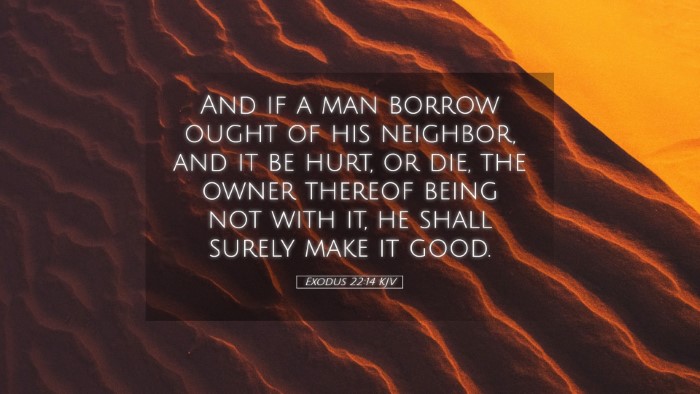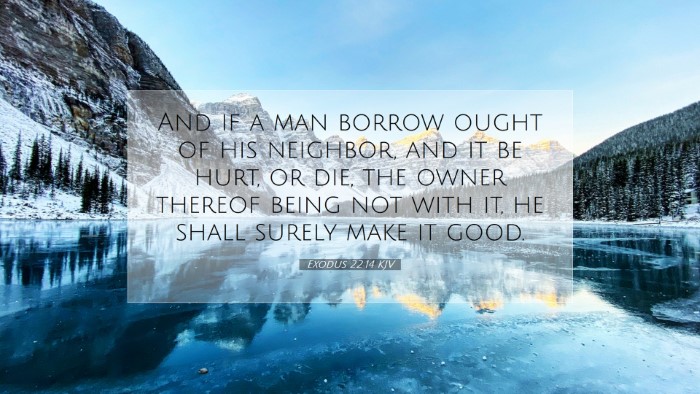Exodus 22:14 Commentary
Bible Verse: "And if a man borrows anything of his neighbor, and it be hurt, or die, the owner thereof being not with it, he shall surely make it good."
Introduction
The verse from Exodus 22:14 captures the essence of responsibility and accountability in relationships, particularly in regards to the use of another's possessions. This principle resonates within the ethical framework of the Mosaic Law, emphasizing not only justice but also the importance of community and trust.
Commentary Overview
This commentary aims to synthesize insights from renowned public domain scholars such as Matthew Henry, Albert Barnes, and Adam Clarke, to provide a comprehensive understanding of Exodus 22:14. The focus will be on the legal implications, moral teachings, and theological significance of the verse.
Legal Implications
Matthew Henry's Perspective: Henry emphasizes that this law illustrates the principle of individual responsibility. When a man borrows an item, he enters into an implicit agreement to take care of it. If the item is damaged or lost due to negligence, the borrower must compensate the owner, thereby reinforcing respect for personal property.
Albert Barnes' Explication: Barnes sheds light on the broader legal context. He notes that this statute aims to establish fairness in interactions between neighbors, explicit in its demand that damages must be rectified. The expectation is that the borrower will act prudently and responsibly, demonstrating good faith in the borrowing relationship.
Adam Clarke's Analysis: Clarke articulates that this law underscores a societal expectation that members should look out for one another’s property. The financial obligation to remedy damages incurs not only a moral duty but also a legal one, fostering an environment of mutual trust and reliance.
Moral Teachings
The moral underpinnings of this verse extend beyond mere legalism. Each commentator highlights the ethical dimensions of borrowing and property rights.
- Responsibility: As seen in Henry’s observations, there is a strong call for accountability. Borrowers must bear the weight of responsibility for an item they’ve taken control over.
- Trust: Barnes alludes to the mutual trust that should exist between individuals. This law is not just about restitution but also about maintaining the integrity of community relationships.
- Integrity: Clarke points out that the act of making recompense is not merely a legal requirement; it reflects one’s character and integrity. Upholding one’s commitments, especially regarding borrowed items, speaks volumes about personal ethics.
Theological Significance
Moving into the theological implications, we see how this verse echoes broader biblical themes regarding stewardship and accountability.
- Divine Stewardship: The concept of stewardship emerges powerfully in this passage. All possessions are ultimately God’s, and how we manage what has been entrusted to us reflects our faithfulness to Him. Borrowing with care mirrors our necessary consideration for God's gifts.
- Community Ethics: This verse signifies how relationships are structured within the community of faith. God’s law aims to ensure harmony and justice among His people, reiterating that every action in our dealings should reflect God’s righteousness.
- Repentance and Restoration: The framework of making restitution is akin to the process of repentance found throughout Scripture. It suggests that genuine accountability leads to restoration of relationships, aligning with God’s desire for reconciliation and wholeness in community.
Conclusion
Exodus 22:14 serves as an enduring reminder of our responsibility towards others in the sphere of personal property. Through the insights provided by Henry, Barnes, and Clarke, we uncover not only a legal framework but also a robust moral and theological foundation that should influence how we live in relation to one another.
As pastors, students, theologians, and Bible scholars engage with this text, they are invited to reflect on the broader implications of accountability, stewardship, and community ethics discipleship within the kingdom of God.


